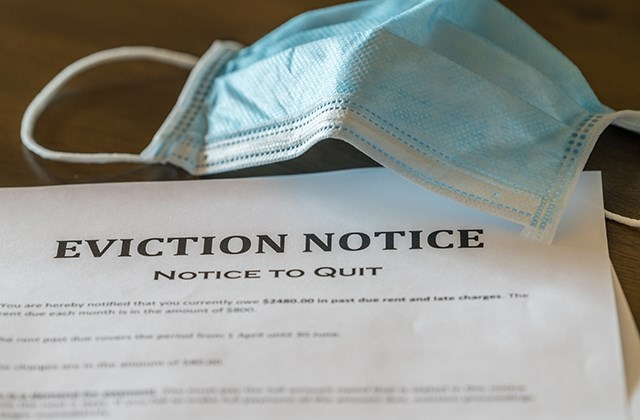Editor's note: This story was originally published by Colorado Newsline. Read the original story here.
***
Colorado’s Division of Housing is trying to dig its way out of a massive backlog of rental assistance requests, which flooded its system throughout December, January and February — and they are hiring more people to do so.
In January, Colorado’s Department of Local Affairs, where the housing division resides, hired disaster response firm Horne to help it catch up on a hefty backlog of requests for the state’s two housing programs: the Property Owner Preservation Program, or POP, which allows landlords to apply on behalf of their tenants, and the Emergency Housing Assistance Program, or EHAP, which allows renters to apply directly to the state.
“That said, it’s still not where we need to be,” Alison George, director of the Division of Housing, told members of the State Housing Board during their monthly meeting on March 9. “We recently have done an assessment and Horne will be hiring temporarily more people, upwards of 50 people actually, in order to catch up on the backlog of both EHAP and POP. So that will be in the next few weeks.”
Since the EHAP program launched at the beginning of the pandemic, the state has received 13,853 applications from tenants totaling more than $57 million, according to the state’s Pandemic Relief Housing Program dashboard.
Of the applications submitted, only 3,457 — or 25% — of the applications have been approved and 983 have been denied, meaning 9,413 applications are still awaiting review.
According to Brett McPherson, a DOLA spokesperson, an applicant can be denied because they submitted a duplicate request or because they lacked necessary documentation.
For the state’s POP program for landlords, the housing division has received 31,592 applications totaling more than $76 million. Of the applications submitted, 20,463 — or nearly 65% — have been approved and 2,360 applications have been denied. Which means 8,768 POP applications have yet to be processed.
The backlog is largely due to a massive increase in applications submitted in January. Colorado housing officials say the increase was due to a combination of factors, including the expiration of the state’s eviction moratorium, increased outreach efforts and a more accessible online application that launched in January.
As rental assistance funds slowly trickle out to those in desperate need of financial support, state eviction filings have steadily increased since Colorado’s eviction moratorium expired.
So far in 2021, 4,046 evictions have been filed throughout the state, according to data provided by the Colorado Judicial Branch. Eviction filings more than doubled from 925 in December to 2,011 in January.
Some renters remain shielded from eviction under the federal eviction moratorium, which, unless extended, expires on March 31. The main difference between Colorado’s eviction moratorium and the federal one is that the state’s ban shielded financially-affected renters with month-to-month or expiring leases from being evicted.
Currently, 27.4% of Colorado adults — down from 36.4% in February — are living in households that are not current on their rent or mortgage payments and where eviction or foreclosure in the next two months is either very likely or somewhat likely, according to the Census Bureau’s Household Pulse Survey.
During the State Housing Board meeting, George reported that in January and February, the department was receiving about 200 applications per day. More recently, she said that number has leveled off to around 100.
“So we’re starting to see that demand level off, which I think is a positive thing,” she said.
But she added that it might not necessarily mean that the need for rental assistance has in fact gone down.
“That could also be playing a part in why the state program is seeing a reduction or a leveling off of applications that we’re receiving,” George said.
Other organizations have also helped fill in the gaps. For example, the Colorado chapter of the national nonprofit 9to5 distributed $382,650 to 693 recipients between April 2020 and February 2021 to help individuals pay rent and utilities, buy groceries and pay for child care, according to a recent report.
George told Housing Board members that there might be light at the end of the tunnel but warned that she doesn’t have a crystal ball.
“The projections that we see still show demand, but as more people are vaccinated and we’re able to open up the capacity of our businesses statewide, I do expect that we’ll start to see a recovery mode,” she said. “That might take a while though.”
Helpful resources
Need to check the status of a rental assistance application? Call 888-480-0066 Monday through Friday from 8:30 a.m. to 5:30 p.m. and Saturdays from 8:30 a.m. to 12:00 p.m.
Facing eviction? Colorado Legal Services provides free legal assistance and representation in eviction actions to low-income individuals and families and Coloradans over 60-years-old.
Have you received an eviction notice? In order to be legally protected under the federal eviction moratorium, which currently expires on March 31, 2021, tenants must fill out this declaration form and submit it to their landlord. (The moratorium does not cover people with expired or month-to-month leases.) Tenants are also able to submit the form when they show up for court.
Need assistance navigating the eviction process? The COVID-19 Eviction Defense Project provides free legal aid and representation to tenants facing eviction and other housing issues related to COVID-19 hardship, regardless of citizenship status. Start by filling out this form. The nonprofits 9to5 Colorado and Colorado Poverty Law Project also provide legal support for housing issues.
Colorado Newsline is part of States Newsroom, a network of news outlets supported by grants and a coalition of donors as a 501c(3) public charity. Colorado Newsline maintains editorial independence. Contact Editor Quentin Young for questions: [email protected]. Follow Colorado Newsline on Facebook and Twitter.



